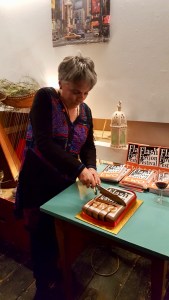Her safe word is ‘circus’
by Sharon Telfer
But that’s before trombone blares clarinet reedy squeaks bass drum thrums and clowns slick her lips oversize scarlet her nose glows holly berry and what’s with her feet seee them streeeetch still everyone knows clowns are scary right so here’s that word slipping through kiss-stopped smack by whiskery sea-lion bark the candystripe ball bouncing to and fro to and fro never dropping dipping into silver-slippery fish pail dipping for silver-glistening prize then whipcrack reels her back a necklace of teeth cradles her throat her head deep in a red raw meat furnace blazing and this must be it now must be no leopard-skin strongman diabolos her up on dappled appaloosa thumpety thump splayed arms she’s tread tread treading thighs to that pounding rump round and round that very second as she’s giddy-sliding her teeth bite, hard, and up she rises in glitterball twirl hanging on nothing but a smile while her toes find a line a fine one and sole by sole she chalks forward her body eeling this way that held up by held breath only and there it is the board she’s going to make it don’t look down the great O below her she looks down her arms wing back legs like clappers ringing a five-bell peal but firm fingers snatch her tipping ankles wrists spin her spirals loops somersaults ‘til hands release a great gasp gusts from under and she’s comet tailing sequins falling no net falling yet here come the clowns again sirenning in hosing glitter while wheels fall off circling like a flower blooming and she lands on her back like a starfish safe at last in the bull’s-eye of the pulled white sheet.
About the Author
 After cutting her teeth on Ad Hoc Fiction, Sharon Telfer won the Bath Flash Fiction Award in June 2016. She has also won the Reflex Fiction Prize, and been selected for Best Microfiction 2019. In 2018, she was awarded the New Writing North/Word Factory Apprenticeship for emerging short story writers. She is an editor at FlashBack Fiction, an online litmag showcasing historical flash. She lives near York, UK, and tweets as @sharontelfer.
After cutting her teeth on Ad Hoc Fiction, Sharon Telfer won the Bath Flash Fiction Award in June 2016. She has also won the Reflex Fiction Prize, and been selected for Best Microfiction 2019. In 2018, she was awarded the New Writing North/Word Factory Apprenticeship for emerging short story writers. She is an editor at FlashBack Fiction, an online litmag showcasing historical flash. She lives near York, UK, and tweets as @sharontelfer.

 Jonathan Saint is a New Zealander living in Dublin since 2000. He left work in 2016 to write fiction for adults and children and wishes he’d done that a long time ago. He was shortlisted for the Writing Magazine inaugural Picture Book Prize in 2017 and won the Christmas Flash at the Staccato Literary Salon in 2018.
Jonathan Saint is a New Zealander living in Dublin since 2000. He left work in 2016 to write fiction for adults and children and wishes he’d done that a long time ago. He was shortlisted for the Writing Magazine inaugural Picture Book Prize in 2017 and won the Christmas Flash at the Staccato Literary Salon in 2018.  Below, our eleventh Award Judge
Below, our eleventh Award Judge  Ad Hoc Fiction, the small independent press that publishes our Bath Flash Fiction Award Anthologies recently published Diane’s Simmons debut full collection of flash fiction Finding A Way. Diane tells Jude how the book came into being and the pictures on this post and in the gallery below are from her recent packed book launch with family and friends at St James Wine Vaults in Bath on February 9th. The collection is available in print to buy in several different currencies from the
Ad Hoc Fiction, the small independent press that publishes our Bath Flash Fiction Award Anthologies recently published Diane’s Simmons debut full collection of flash fiction Finding A Way. Diane tells Jude how the book came into being and the pictures on this post and in the gallery below are from her recent packed book launch with family and friends at St James Wine Vaults in Bath on February 9th. The collection is available in print to buy in several different currencies from the 
 We are thrilled that micro fictions by five authors who won prizes, or were listed in our Bath Flash Fiction Awards 2018 and one winner from Ad Hoc Fiction were selected by guest editor, Dan Chaon from lists drawn up by series editors Meg Pokrass and Gary Fincke for their new anthology series Best Microfiction.
We are thrilled that micro fictions by five authors who won prizes, or were listed in our Bath Flash Fiction Awards 2018 and one winner from Ad Hoc Fiction were selected by guest editor, Dan Chaon from lists drawn up by series editors Meg Pokrass and Gary Fincke for their new anthology series Best Microfiction. The gallery room at
The gallery room at 
 In the first half of the evening, ten writers, pictured in a group here, and who you can see individually in the gallery below, read their micros from Flash Fiction Festival Two, beginning with well-known flash writer, poet and Reader at Bath Spa University,
In the first half of the evening, ten writers, pictured in a group here, and who you can see individually in the gallery below, read their micros from Flash Fiction Festival Two, beginning with well-known flash writer, poet and Reader at Bath Spa University, 
 We are excited to be launching our two latest anthologies this week, on Saturday 19th January at
We are excited to be launching our two latest anthologies this week, on Saturday 19th January at